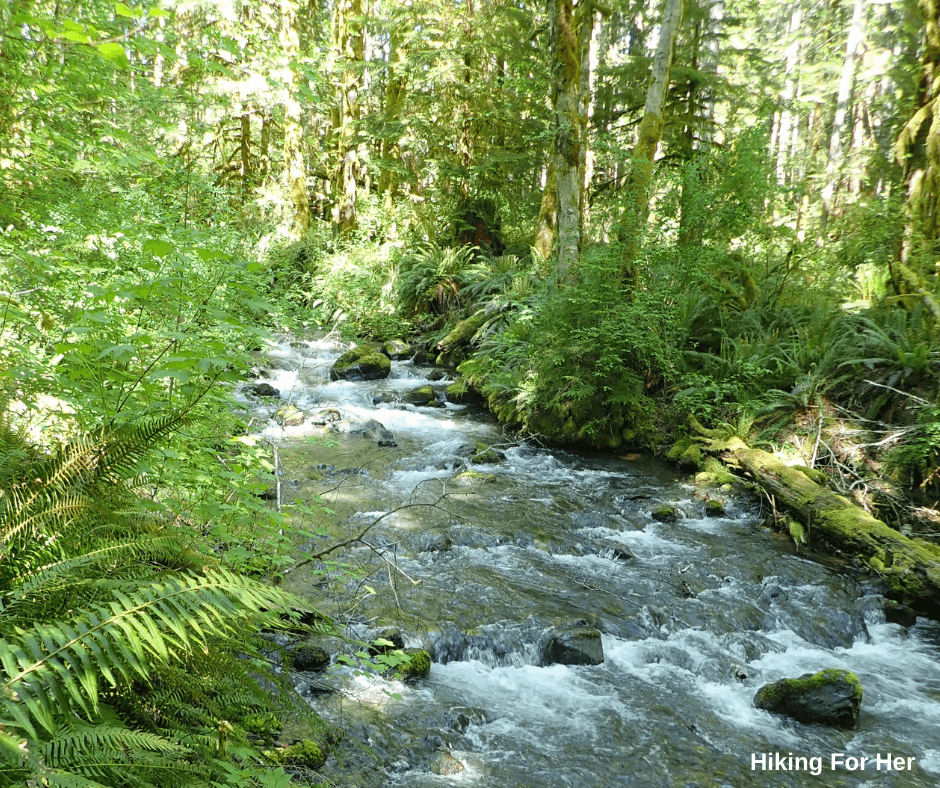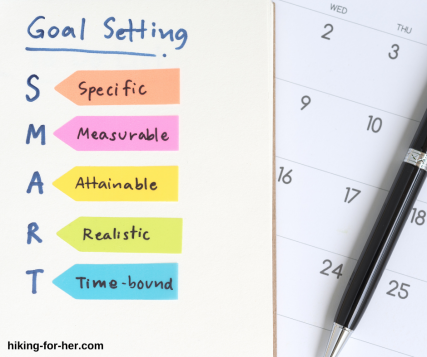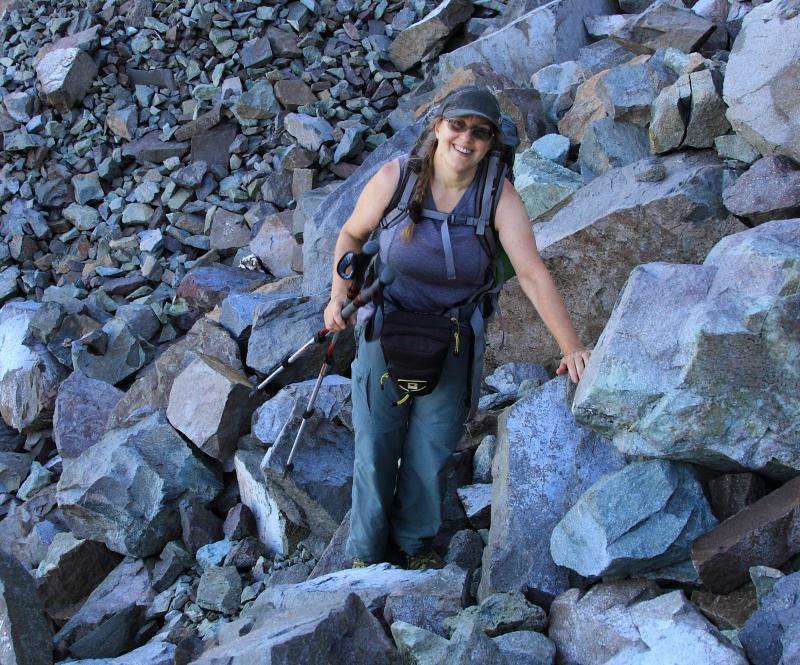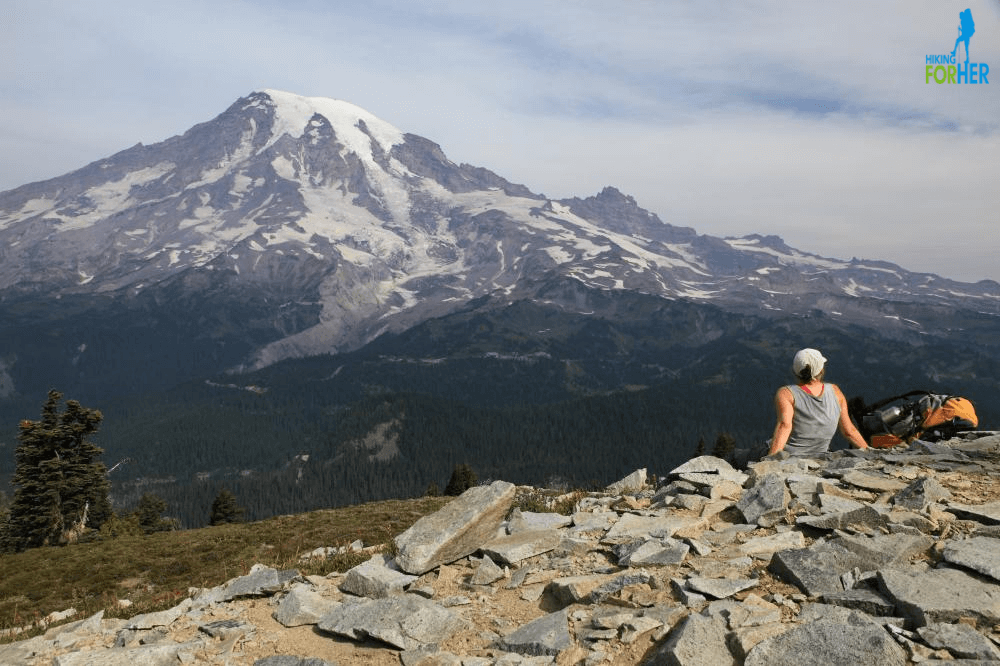
Hiking Goals:
Strategies To Achieve Them
By Diane Spicer
To set and achieve hiking goals, regardless of how ambitious or straightforward they may seem, you need a plan.
- Wishing?
- Hoping?
- Playing the "Maybe someday" game?
Not gonna cut it if you want to get things done as a hiker.
Find out right here how to clarify and achieve your goals as a hiker before another year slips by.
You can do this!
You just need some answers to focused questions, and a plan.
So let me walk you through what that looks like (walk you through... a little hiking humor to get us rolling never hurts).
For your convenience, this information on how to set and achieve hiking goals is organized like this:
1. Define and identify your target goals
2. Motivation: internal versus external
3. Hiking goals: some examples
Define your target goals
It's tough to achieve a goal when it's fuzzy and indistinct, I'm sure you agree.
So let's start with the easy stuff:
- where you want to hike
- who you want to hike with
- when you want to, or can, hike
You've probably got enough information right now to figure out that part of your goal.
Or maybe not! Take a moment to dream a little.
Now here's reality: to pull off an ambitious hiking goal regardless of where or when you go, you've got some work to do:
- a lot of questions to answer
- data to gather
- skills to learn
- gear to borrow or buy
This website can help you find what you need quickly as you plan to conquer your hiking goals, so use the search box at the top of every page.
Now since you're here, let's get more specific about the type of hiking goal(s) you have in mind.
Which type of hiking goal(s)
resonate with you?
So what kind of hiking goals do you have in mind?
I've seen, heard and talked to a lot of hikers in my time, and I can tell you one thing: every person truly wants to hike her own hike.
That means each hiker carries an inbuilt definition of what achieving a hiking goal looks like, and the words used to describe it:
- short, long, or something in between
- epic, one of a kind hiking versus "in my backyard" area, or brand name trails
- just getting started, or going for the gusto
- strenuous or easy or middle ground
- day hike, backpacking trip, section hike or thruhike
- - use your favorite description here -
This is a good place to throw in a few words about motivation. Because while you may start off with your hair on fire to get your goals conquered, it may be tough to stay motivated as the weeks roll on.
And by motivation, I mean "internal" versus "external".
Let's take a look.
Internal motivation
to achieve hiking goals
A hiker who needs to hike on a regular basis to stay on an even keel knows the internal pressure of scheduling trail time.
It's like a dog that needs to be walked at regular intervals.
Except your body is the dog, if that makes sense.
An internally motivated hiker will:
- prioritize hikes over social events
- pay close attention to the type of hike that satisfies that itch/need to be hiking
- gain skills and gear to make hiking even more pleasurable and safe
- juggle her weekly schedule to make room for outdoor time, the more the better
- take an active hiking vacation over a beach resort stay
An intrinsically motivated hiker will not be looking for goals that can be checked off or displayed for bragging rights.
Instead, she seeks satisfying trail time that might not even look like an "epic" or "hard" hike to anyone else.
She knows what she wants, social media selfies be damned ;)
And she feels really good when she achieves it.
External motivation
and hiking goals
The flip side of approaching trail time is with a checklist or bucket list in hand, maybe with something to prove.
Setting a goal with a tangible pay off is what makes an externally motivated type of hiker get her boots on: mileage, time, season, destination all matter when focusing on a hiking goal.
Also, it might look a bit competitive to other hikers, as in chasing the "Fastest Known Time" or "Triple Crown".
- Pitting oneself against what others have done is a good motivator for some hikers.
- "Can I really do this?" is this hiker's catnip.
And it always carries social media bragging rights, with photos and trail experiences to share far and wide.
Maybe even a book!
Do you respond well to any of these?
- Recognition of your goals by someone, or some group
- The feeling of satisfaction when you can point to your tangible achievement
- Sharing your new knowledge with others in some way
Does any of this resonate with you? If so, you're externally motivated to set and achieve hiking goals.
More thoughts on 3 approaches to hiking motivation here
Setting your hiking goals:
pick one to get started!
Now that you've pondered which type of motivation describes you best, let's get more specific about setting goals.
- Hard to hit a target you can't see, right?
There are as many types of hiking goals as there are hikers, but we can generalize a bit to get your brain cells sparking.
Here are just a few ways to approach setting a hiking goal.
Pick an annual theme
Would a theme help you set some realistic hiking goals?
Here are some examples:
Getting stronger than you are right now, perhaps.
Venturing outside your comfort zone in terms of a solo hike, or an overnight trip.
Exploring new terrain, or old terrain at different times of day (night hikes) or year (snowshoeing).
Breaking a personal best in terms of mileage per hike, altitude, or time.
Changing your body metrics while hiking (weight, waist circumference, lung capacity, body fat percentage, flexibility)
Section hiking a long trail like the Pacific Crest or Appalachian trails, chipping away at the mileage one section each year until it's complete.
These are just a few ideas, but in reality, the sky is literally the limit! So set yourself a goal and then get planning for next summer (keep reading for a strategy).
 Picture yourself here!
Picture yourself here!
Focus on a number
If quantifying your hiking time sounds good, you can:
- Pick a certain number of bucket list hikes to work toward annually
- Set a specific number to shoot for: total miles, hikes per year, altitude or elevation loss/gain
- Visit all national parks in a particular country
- Concentrate on particular terrain or land features: waterfalls, viewpoints, deep silent forest, desert, high alpine
- Use the year to set the number of hikes you do: 22 hikes in 2022, for example
- Join a group in a trail challenge of some
kind, maybe to raise a specific dollar amount for a cause that is important to you
- Achieve status as a long trail hiker by completing the many miles of the AT, PCT, CDT or some other established trail system
These are all measurable goals.
If you like the satisfaction of crossing things off a list, this approach is for you!
Explore within a defined geographic area
How about hiking every trail within (x) miles of your home? That's an attainable goal with a minimum of planning time.
Or could you devote your vacation time to an area vastly different from your normal hiking routine, then do serial day hikes or a long backpacking trip there?
- There are a lot of high trails for your boots in Colorado (14'ers) and Washington State (North Cascades).
You can also pick a brand new continent, and start exploring! Greenland is waiting for you ;)
Bump it up a notch
If you self identify as a beginner hiker, maybe you want to set a goal to get to the intermediate level next season.
That means you'll have to train for longer distances, more aggressive terrain, and variable weather conditions.
How to meet that goal? Here are two ways:
- Inside my Over Forty Hiker community, we have a free course for how to train for your hiking goals. You can receive an invitation to the community here.
- Or find a personal trainer who can motivate you to begin moving more, and in the right kinds of ways, to kick your hiking up a notch.
Above all, keep your expectations realistic.
Example:
- If you've only done short day hikes, and decide to conquer the Pacific Crest Trail next year, you're going to have to work for it.
- On the other hand, if you want to hike one hour longer per hike, that's well within your reach.
How to achieve your hiking goals:
let's make a three step plan
Here's a way to make your hiking goals a reality (and add a bunch of photos and memories to your hiking treasure trove).
Customize it so it fits your needs, and then get out there and get 'er done!
The plan overview:
- Break goals into achievable sub goals
- Enlist help
- Prepare for obstacles
1. Break your goals into sub goals
Bite sized pieces, in other words.
An example: If you're set on one hike in every state park within 200 miles this year, decide if you want to cast your net wide at first, or start hyper-local.
Get out a map, draw your 200 mile circle, and start a list in a brand new trail journal, something like this:
- within 20 minutes of home...
- all the way up to "needs to be an overnight, due to traffic or road conditions and my available time"
Start another list of your current limitations. We all have a finite amount of time, money, physical constraints, and support within a relationship.
And we all have existing time obligations to our family, friends, pets, co-workers and community, so factor that in.
- The end result shows you just how much latitude you have for hiking, given your current daily life.
Now look at your personal, work and/or school schedule for the next few months.
- How can you make time for each of these hikes?
- How will you afford them?
- What will you have to give up or miss?
Now you're in good shape to go further with your goal setting!
Honesty is paramount
Be honest with yourself about what’s driving you toward this particular goal.
If you understand your motivation, you’re more likely to stick it out for the long haul.
WHY do you want to do this?
What RESULTS are you’re seeking?
Dig deep
Here's where you get to unearth the real, true reason you want to achieve any particular hiking goal.
Knowing why translates into a steady stream of motivation, no matter what life and the trail can throw at you.
Maybe you can't quite articulate the "why" yet, but I bet you can pinpoint the result you're after.
So let's keep going...
Questions you might not love to answer
There is more honesty to be had, if you're willing.
Example: If you want to hike every trail within 200 miles of your doorsetp within 6 months, and you only have Saturdays to do it, be honest with yourself.
- Will you love getting up at 5A to hit the trailhead after a full week of responsibilities?
- Will you want to hike when it's raining or cold in order to meet your goal?
- Will you get your gear and food together the night before to make an early morning easier?
- Will you be okay saying no to a loved one who asks you to help her move on Saturday?
But don't get locked into that goal just yet.
Remain flexible and patient with yourself!
Life has a way of blowing up the best laid plans, including sub goals.
Here's where frustration creeps in.
And that can lead to abandoning your hiking goals.
Be proactive.
Know ahead of time a few tricks to keep your motivation strong.
Here's an approach I've used:
Put together a photo stash of the hikes you want to do. Or gather some background info and maps to make your own visuals, lists, checklists, whatever you need to get started.
Pull them out and gaze upon them when your motivation flags. You want your own photos and memories of this area, right?
And there's only one way to get them!
Meaning it's time to go on to Step Two.
2. Enlist some help
If you're internally motivated, you might scoff at the notion that
you should loop in at least one other person and make her part of your
hiking goals.
Flip side: An externally motivated hiker might already have a wide network of support to draw upon, which is no small thing.
But either way, consider telling someone what your goals and timeline are. It's a good way to stay accountable and motivated.
Be choosy
But you should be careful about who that person is.
You
don't want your parade hiking goals rained on (Mother Nature is
standing by to do just that, but that's a topic for this page).
You also don't want to choose a person who is going to cut you a lot of slack, or just nod and smile when you share your goals.
Tough love, not too tough but not a push over, is what you're going for.
Find that person! Who do you know that can help you toward your hiking goals?
You can go one of two ways with this choice
of who to trust with your goals
A non-hiker might be able to maintain a tough "just get it done" stance by not knowing exactly what each hike entails. That could work for, or against, your goals, depending on your personality.
A seasoned hiker could be compassionate AND realistic, and come up with some motivators that make sense for you. Or they could ho-hum your goals if they're hiking at a different level.
But here's the punch line:
- Your trusted person should be someone you can celebrate with once you achieve your hiking goals!
Why not consider joining our Over Forty Hiker virtual hiking circle? We'd love to help you plan, and of course celebrate with you!
Do these things with your helper to stay on track
Schedule check-ins with your trusted person.
Each time you meet (virtually or in person), share your answers to these questions:
- Where am I in terms of my goals?
- What can I change, or do more/less of, to progress toward my goals?
- Am I feeling discouraged? Why?
- What am I doing particularly well?
- Does any part of the goal need to be changed?
Agree ahead of time what to do if your motivation flags, or you're off track.
Do you want encouragement? Stern words? Cat memes?
Don't get discouraged if life hands you a lot of distractions any one particular week. Get back on track as soon as possible.
Remember, you're in charge of these goals!
3. Welcome & embrace obstacles
That sounds bizarre, you say.
Obstacles = pain.
Here's the reality: You're going to run into something you need to achieve your goals, and it's going to cost you something to get past it.
Examples of what you might need for achieving your hiking goals:
- Sharper outdoor skills
- New or different gear
- More information or knowledge about an area
- Increased conditioning
- Physical healing
- A daily commitment to wellness (smoking cessation, for example)
- A mental re-set or adjustment of your flagging motivation
And who knows what else?
To reach your goal, you are going to have to accept some discomfort, inconvenience, and cost.
True story! (Don't click away just yet.)
That will be the time when your goals
might fall apart
How much are you willing to sacrifice to achieve your goals?
That question might bring you to the breaking point.
But you're smarter than that.
Here's what you're going to do:
Watch for an obstacle to pop up, identify its potential impact on your goals, and then re-frame it as an opportunity.
- You set a goal some time ago.
- Now something stands in your way.
- How will you rise to the challenge?
One foot in front of the other
Chasing a hiking goal can change your life!
To keep going, marshal your resources.
You've got one person in mind as your support.
This website is also here to help you.
All of the information is free, and written by someone (me) who has hiked for five decades.
I link only to trusted resources and reliable knowledge. I regard you as my virtual hiking buddy.
And
if you need personal support, consider joining our Over Forty Hiker
community. It's a private walled garden where your goals can flourish.
Now it's time to call a monster out of the dark and take a good look at it. Otherwise, your goals could be sabotaged, and vaporized.
Identify what lurks beneath
Wait, what monster?
There are a lot of scary emotions tied up with setting and achieving your hiking goals.
Perhaps you didn't realize this yet.
Here's the big one, the one that people might consider monstrous because it stops you in your tracks the most ...
Fear
And that comes in a lot of unpalatable flavors:
- fear of the unknown
- fear of being judged by others
- fear of failing
- fear of physical discomfort or pain or injury
- fear of danger on the trail
- fear of damaging a relationship if you pursue big goals
- fear of achieving the goal... what will you do next?
- fear of (fill in the blank with your own personal fear demon)
Fear makes you want to back away from your goals. (bad news)
But it carries energy with it. (good news)
Emotions are just energy in motion, the way I look at it.
Harness that energy, and turn it into high octane fuel to achieve your goals.
To do that, here's a plan:
Play it S.M.A.R.T

Perhaps you've seen this acronym before.
I've played it SMART in my career to set and achieve goals despite a crushing workload and a busy personal life.
And used it for setting hiking goals, too.
Why does it work?
Because it provides a solid framework to hold you accountable - to yourself, to your trail buddies, to anyone who takes an interest in your hiking goals.
Here's an example of how to use this approach
To get you thinking along SMART lines, here are questions to ask yourself about your goal:
- Specific: What type & length of hike are you planning, in which location?
- Measurable: How many checklists do you need to prepare and do the hike?
- Attainable: Are you in shape, mentally and physically, or will you be soon?
- Relevant: How will achieving this goal satisfy your craving for trail time?
- Time bound: Do you have a countdown to Day 1, and a dedicated amount of time set aside to achieve this goal?
Seems like a lot of things to consider, but here's the most important question of all:
- Do you see how what you've already read on this page fits this criteria?
You're well on your way to achieving
your hiking goals!
You have (at least a vague) idea of what you want to achieve.
You've invested the time to read through to the end.
You've gleaned some ideas, and a strategy, to make your hiking goals a reality.
Life is short, but hiking trails don't have to be, so get out there and make some boot prints!
I'm cheering for you :)
Home page > Hiking Resources >
Strategy To Achieve Hiking Goals
|
I get emails all the time about what I wear, eat, carry and love to use on the trail. That's
why I provide affiliate links to you: the best gear that I use myself and have seen used by other hikers is instantly
available for your consideration, and the gear company sends a few
pennies per dollar to this reader-supported hiking website. There is no added cost to you! Everyone ends up a winner: Great gear for you, strong gear companies, and more free hiking tips for everyone. Thanks very much for your support. It's warmly and sincerely appreciated. It also helps send these hiking tips to all your virtual trail buddies around the globe. |
 |



